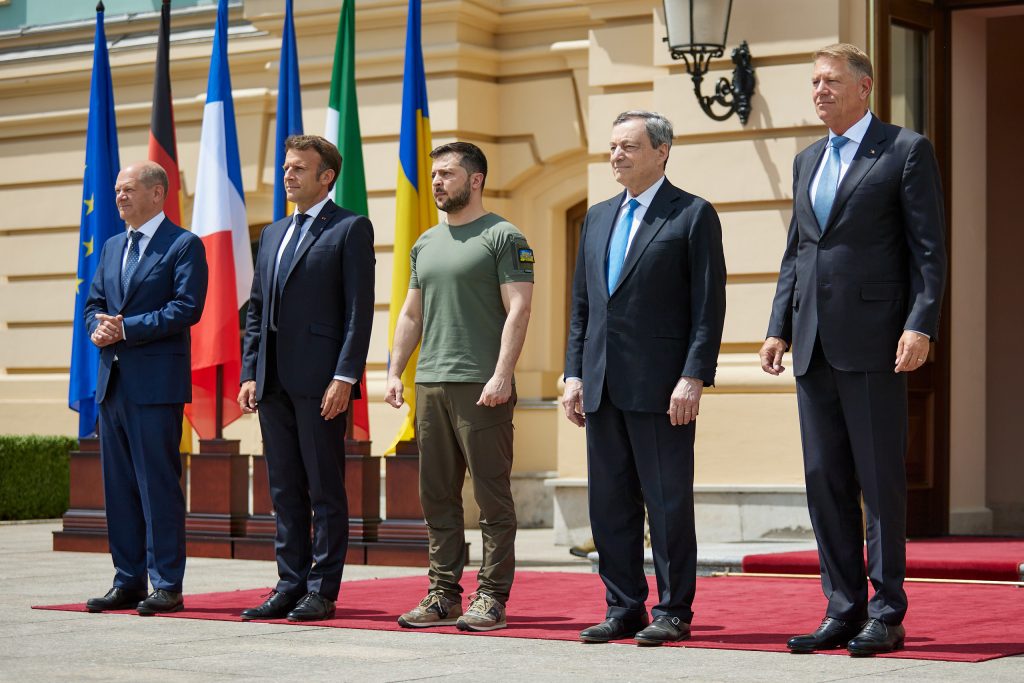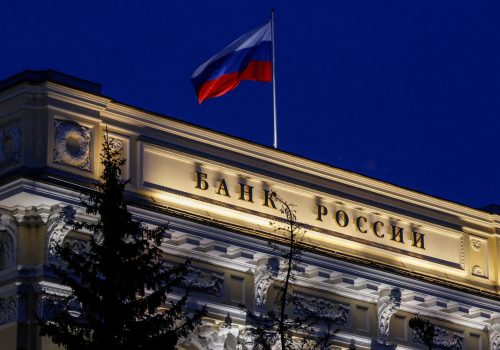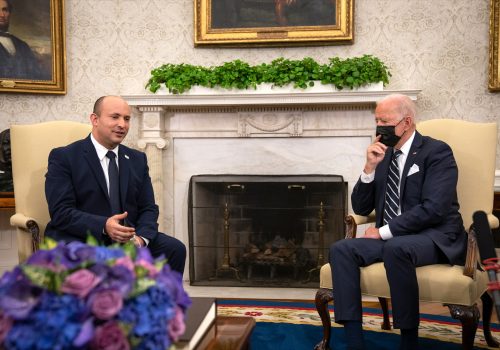Europe has been rewiring itself in impressive ways in the four months since Russian President Vladimir Putin launched his invasion of Ukraine.
The coming weeks will show whether that work of building a more resolute European Union for a future of new geopolitical challenges will continue—or, instead, if the rewiring will short-circuit before the job is done in the face of rising economic headwinds and Putin’s grinding war of attrition.
Thus far, the European Union (EU) has remained unified with the United States and others behind an unprecedented set of sanctions on Russia. Further, it has begun to strengthen its hard power through increased defense spending, and it has moved swiftly to reduce its shameful energy dependence on Moscow. Most recently the Group of Seven (G7) appears poised to announce an import ban on Russian gold.
In ways Putin never envisioned when he hatched his war, the EU has committed itself to ensuring Ukraine’s future as a democratic, independent, and European country through billions of euros of economic support, unprecedented arms deliveries, and now an offer of membership candidacy to Ukraine and Moldova.
As NATO prepares to open its summit in Madrid this week, Russian Foreign Minister Sergei Lavrov voiced Moscow’s growing concern about EU unity of purpose alongside the alliance. He said the EU and NATO were building a coalition to engage in a war with Moscow that he compared to “Hitler during World War II.” As laughable as Lavrov sounds to reasonable ears—this era’s tyrannical dictator sits in Moscow and not Berlin—it underscores Putin’s worries about Western common cause and his warped view of history.
Yet as impressive as the EU rewiring project has been thus far, it’s likely to short-circuit in the months ahead unless the political conviction grows even stronger around this historic moment. That will demand faster implementation of new defense and energy policies—and greater support for Ukraine.
As Putin gains ground in Ukraine, with new strikes on Kyiv today almost certainly timed to coincide with the G7 meeting in Germany, it will take all the political will European leaders can muster. They will face greater public pressures to end the war with benchmark gas prices climbing an additional 15 percent in the last week amidst the double shocks of Russian cuts and a fire at Freeport LNG in Texas, with inflation reaching 8.1 percent in the euro area in May, and with economic recession dangers rising rapidly, given the threat of Russian gas cutoffs this winter.
On another front, European Central Bank President Christine Lagarde summoned her colleagues to an emergency session last week in Frankfurt that was designed to generate solidarity around steps to preempt any danger of a new Eurozone debt crisis reaching Italy from the dual shocks of rising inflation and slowing growth.
Putin is counting on the usual fatigue and political divisions that set in among Western democracies when they must weigh growing domestic concerns against international dangers. He’s seen enough to encourage him, including newly re-elected Emmanuel Macron’s failure to win a majority in the National Assembly, the first time in thirty years that’s been denied the French president.
And for all the impressive arms shipments and economic support the Biden administration has delivered Ukraine, the weaponry firing range of some fifty miles remains insufficient to stop the Russian carpet-bombing, for fear of expanding the war.
Beyond that, Putin knows US midterm elections are likely to weaken Biden further amid domestic disputes over the Supreme Court’s overturning of the Roe v. Wade abortion protections and the country’s continuing disputes over gun laws. Even as Putin’s war grows uglier, Americans are seeing less of it on their TV screens.
Meanwhile, German Chancellor Olaf Scholz is also looking weaker than in his first days in office, as he hosts the G7 leaders in the Bavarian Alps this weekend.
Scholtz faced such a storm of criticism that he’s been dragging his feet on heavy weapons deliveries to Ukraine that his Defense Ministry was compelled to publish a full list of completed and planned deliveries, including seven self-propelled Panzerhaubitze 2000 howitzers that at long last have arrived in Ukraine.
It’s worth remembering that Europe’s greatest moments of forward progress typically come at times of crisis, as has been the case again following Putin’s war in Ukraine. It’s at such times that member states better manage their divisions and work more effectively around the EU’s mind-bending bureaucracy.
The problem is that the current European divide that looks hardest to fix is a fundamental disagreement over how important a Ukrainian victory is and what it would take to bring it about.
The closer you live to Russia as an EU citizen, the more you argue, as I did in this space on June 5, that Putin doesn’t need the diplomatic off-ramp that Macron is offering but rather the dead-end that can only be brought by tougher sanctions and a more effective Ukrainian counter-offensive backed by longer-range weapons.
Russia’s closest neighbors know that a bad peace in which Ukraine gives up new territory will only provide a respite before Putin resumes his imperial efforts to take all of Ukraine and ultimately other former Soviet areas.
In Western Europe, the desire is greater for a peace that would end the war now, even if the outcome leaves Putin in power and, as Macron has said, avoids humiliating him.
“Despite the celebratory rhetoric in Brussels about the European Union’s surprisingly robust response to Russia’s invasion of Ukraine…” writes Eoin Drea this week in Foreign Policy, “the war has not united the bloc in any unprecedented or transformative way. In fact, it’s having exactly the opposite effect: Beneath the soaring vista of Ukraine as a catalyst for a more muscular and geopolitically effective EU like deep divisions, shifting allegiances, and a much more complex reality.”
Counterbalancing that gloom, Macron, Scholz, Italian Prime Minister Mario Draghi, and Romanian President Klaus Iohannis visited Kyiv on June 16 to hammer home their support for Ukrainian security and European ambitions.
Shortly after they returned, the European Parliament voted with 529 votes to 45 against and 14 abstentions to adopt a resolution calling on the heads of state or government to grant EU candidate status to Ukraine and Moldova, which they have now done.
That symbolism must now be complemented by even greater substance. The rewiring of the EU has only just begun to strengthen its defenses, diversify its energy sources, tighten its transatlantic links, and ensure Ukraine’s survival as a sovereign, free European state.
To stay the course, European leaders and citizens must understand what they are doing isn’t just for Ukraine but even more for themselves. The lessons from two devastating World Wars and a Cold War are that staying unified is a prerequisite for victory and that appeasing despots is always self-defeating.
This article originally appeared on CNBC.com
Frederick Kempe is president and chief executive officer of the Atlantic Council. You can follow him on Twitter @FredKempe.
THE WEEK’S TOP READS
#1 How Far Do Putin’s Imperial Ambitions Go?
Yaroslav Trofimov | WALL STREET JOURNAL
In this chilling analysis, Yaroslav Trofimov lays out in frightening detail just how far Putin’s imperial ambitions might take him.
Trofimov opens with a bizarre and telling scene, in which Putin, long before his Ukraine invasion, makes a spectacle out of contradicting a nine-year-old on the question of where Russia’s borders end.
“’At the Bering Strait with the United States,’ the nine-year-old boy ventured hesitantly. Putin, who chairs the board of the Russian Geographic Society, contradicted the boy to triumphant applause ‘The borders of Russia,’ he pronounced, ‘never end.'”
“Earlier this month,” writes Trofimov, “Putin said that he views Ukraine as just the first step, with many other territories potential targets.” Just this month in St. Petersburg, while honoring the 350th anniversary of Peter the Great, he said that when Peter conquered Sweden “he was merely returning what is ours, and strengthening it.” Read more →
#2 What If Russia Uses Nuclear Weapons in Ukraine?
Eric Schlosser | THE ATLANTIC
As Putin’s war in Ukraine bogs down into a battle of attrition, the danger that Vladimir Putin will deploy battlefield nuclear weapons persists. In this richly reported piece, Eric Schlosser interviews nuclear weapons exports to explore what could happen—and how the United States could respond.
“The risk of nuclear war,” Schlosser warns, “is greater today than at any other time since the Cuban missile crisis. And the decisions that would have to be made after a Russian nuclear strike on Ukraine are unprecedented. In 1945, when the United States destroyed two Japanese cities with atomic bombs, it was the world’s sole nuclear power. Nine countries now possess nuclear weapons, others may soon obtain them, and the potential for things going terribly wrong has vastly increased.” Read more →
#3 What Makes a Power Great
Michael J. Mazarr | FOREIGN AFFAIRS
In this smart, in-depth analysis, Michael Mazarr draws from a RAND corporation study on what makes great powers—and how they can fall.
Over the course of fifteen months, Mazarr led a RAND Corporation study for the US Defense Department’s Office of Net Assessment, supported by analysis from outside historians. The study isolated a number of national characteristics that throughout history have underpinned national competitive success—”including a strong national ambition, a culture of learning and adaptation, and significant diversity and pluralism.”
“These domestic strengths are the building blocks of international power. But,” Mazarr warns, “to enable a country to succeed, they must reinforce and support one another. And they must not fall out of balance. Too much national ambition, for instance, can lead to overreach, imperiling the country that overcommits itself. But countries with too little ambition, diversity, or willingness to learn and adapt risk starting a negative cycle that can spiral into national decline.”
Read this study to learn why it is that the United States, if it is to prevail in the years ahead in contests with China and Russia, “will have to do more than just outspend its rivals on defense or advanced military technologies. It will have to nurture the qualities that make great powers dynamic, innovative, and adaptive. Read more →
#4 After a Pivotal Period in Ukraine, US Officials Predict the War’s Path
Helene Cooper, Eric Schmitt, Julian E. Barnes| NEW YORK TIMES
Based on analyses by a number of US defense officials, including Atlantic Council military fellows, this New York Times article provides a useful examination of how the US defense establishment expects the war in Ukraine to unfold.
Now that four to six weeks have passed since Russia shifted its main focus to eastern Ukraine, Cooper, Schmitt, and Barnes write, “officials say the picture is increasingly clear: Russia is likely to end up with more territory, they said, but neither side will gain full control of the region as a depleted Russian military faces an opponent armed with increasingly sophisticated weapons.”
In this situation, they add, “other analysts predict a back and forth that could stretch for months or even years. ‘This is likely to keep going, with each side trading territory on the margins,’ [director of Russian studies at CNA Michael] Kofman said. ‘It’s going to be a dynamic situation. There are unlikely to be significant collapses or major surrenders.’”Read more →
#5 A Ukrainian Refugee’s Fight To Save The Family She Left Behind
Ed Caesar | NEW YORKER
This week’s must-read is Ed Caesar’s riveting, heartbreaking New Yorker piece about a Ukrainian family separated by the war and navigating life as refugees from Putin’s war.
Follow Inna Blahonravina and her daughters Sasha and Oliviia as they depart Ukraine in midst of Russian air-raids on Kiev, leaving Inna’s husband Maksym behind. It is a chronicle of resilience and separation, fear, and hope, and it shows a portion of the vast human cost of Putin’s brutal invasion of Ukraine.
“Once,” Caesar writes, “Oliviia looked over Inna’s shoulder as she read on her phone about an attack on Kyiv. The report was accompanied by an image of a building on fire, with rescuers at the scene. Oliviia asked who the people in the photograph were—whether they were Russian or Ukrainian, and if one of them was Vladimir Putin. Then she said, ‘Mommy, I’m so glad we’re not killed.’ Every day, the kids had video calls with their father. Maksym tried to keep the conversations lighthearted, but even banal topics could be laced with sadness.
“‘Do you miss the cats?’” he’d ask.” Read more →
Atlantic Council top reads
Image: Chancellor of the Federal Republic of Germany Olaf Scholz, President of the French Republic Emmanuel Macron, President of Ukraine Volodymyr Zelenskyy, President of the Council of Ministers of the Italian Republic Mario Draghi and President of Romania Klaus Iohannis (L to R) are pictured during the official welcome ceremony outside the Mariinskyi Palace, Kyiv, capital of Ukraine.



